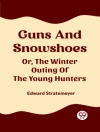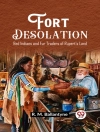In ‘The Claim Jumpers, ‘ Stewart Edward White immerses readers in the rugged and tumultuous world of the American West during the late 19th century. The novel artfully combines elements of adventure, romance, and social commentary, showcasing the complexities of land disputes and the indomitable human spirit amidst the challenges of frontier life. White’s vivid prose and keen observational skills capture the breathtaking landscapes and the gritty realities of gold fever, while also exploring themes of ethics and individualism in a rapidly changing society. Stewart Edward White, a prominent early 20th-century author, was deeply influenced by his experiences in the outdoor realms of California and the Pacific Northwest. His background as a raconteur, coupled with a keen interest in the Native American cultures, significantly informed his narrative choices in ‘The Claim Jumpers.’ White’s firsthand engagement with the land and its history serves to create an authentic portrayal of the struggles faced by fortune seekers and the moral dilemmas that arise in the quest for prosperity. Readers who seek an engrossing tale of adventure, moral complexity, and vivid characterizations will find ‘The Claim Jumpers’ an indispensable addition to their literary collection. White’s masterful storytelling invites contemplation about ambition and justice, making it a thought-provoking choice for both lovers of historical fiction and those intrigued by the American mythos.
Об авторе
Stewart Edward White (1873–1946) was an American author and a pioneer in the early twentieth-century literary world. Best known for his adventure stories and novels set in the American West, White made a significant contribution to the genre of Western literature with works such as ‘The Claim Jumpers’ (1901), which vividly depicted the lawlessness and the struggles over mining claims during the frontier era. Born in Grand Rapids, Michigan, White’s upbringing in the Midwest and his subsequent experiences in the Western United States provided the authentic backdrop for his captivating works. White’s literary style often blended realistic portrayals of frontier life with romanticized elements of heroism and endurance, capturing the untamed spirit of the burgeoning America. Apart from his fiction, White also delved into non-fiction, writing about the outdoors, nature, and the philosophy of recreation in titles like ‘The Mountains’ (1904) and ‘Camp and Trail’ (1907). His narratives were characterized by a fluent prose style, robust characterizations, and an innate ability to convey the vast landscapes of the American wilderness. Over his lengthy career, White’s contribution to literature extended well beyond the sphere of Westerns, also presenting themes of supernaturalism and self-reliance, which continues to influence the genre to this day.












